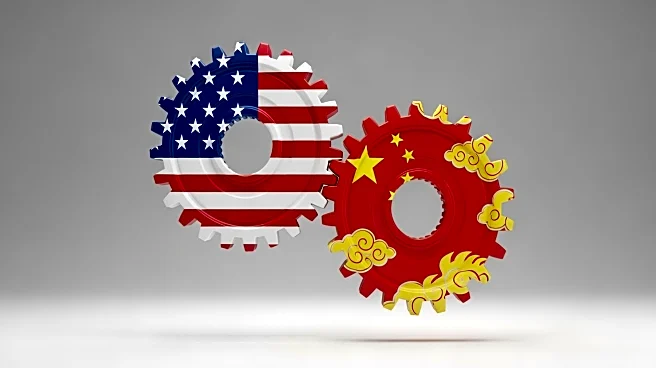What's Happening?
China has announced a one-year suspension of port fees on U.S.-linked vessels, following a similar pause by the U.S. on punitive actions against China's shipping and shipbuilding sectors. This reciprocal
move aligns with agreements made between President Trump and Chinese President Xi Jinping during a recent summit in South Korea. The suspension is part of efforts to stabilize bilateral ties and address trade tensions. The U.S. Trade Representative's office has paused actions related to China's 'Section 301' unfair trade practices investigation, signaling a willingness to negotiate on related issues. China's commerce ministry has expressed hope for continued cooperation to further stabilize relations.
Why It's Important?
The suspension of port fees and punitive actions marks a significant step in U.S.-China trade relations, potentially easing tensions between the two economic giants. This development could impact global shipping and trade dynamics, benefiting industries reliant on international logistics. The move may also influence broader economic policies and negotiations, as both countries seek to stabilize and improve bilateral ties. The suspension reflects a strategic approach to resolving trade disputes, with potential implications for future agreements and economic cooperation. Stakeholders in the shipping and trade sectors may experience reduced costs and increased predictability in operations.
What's Next?
Negotiations between the U.S. and China are expected to continue, with both sides aiming to address trade imbalances and unfair practices. The outcome of these discussions could shape future trade policies and agreements, impacting global economic stability. The suspension of port fees may serve as a foundation for further cooperation, potentially leading to more comprehensive trade deals. Stakeholders, including businesses and policymakers, will likely monitor developments closely, as the negotiations could influence market conditions and international trade regulations. The success of these efforts may depend on mutual respect and equal consultation between the two nations.
Beyond the Headlines
The reciprocal suspension of fees highlights the complexities of international trade relations and the importance of diplomacy in resolving disputes. This development may prompt discussions on the role of economic policies in fostering global cooperation and stability. The move could also influence perceptions of U.S.-China relations, with potential implications for geopolitical dynamics and alliances. As both countries navigate trade negotiations, the emphasis on mutual respect and consultation may set a precedent for future diplomatic engagements, encouraging collaborative approaches to global challenges.









